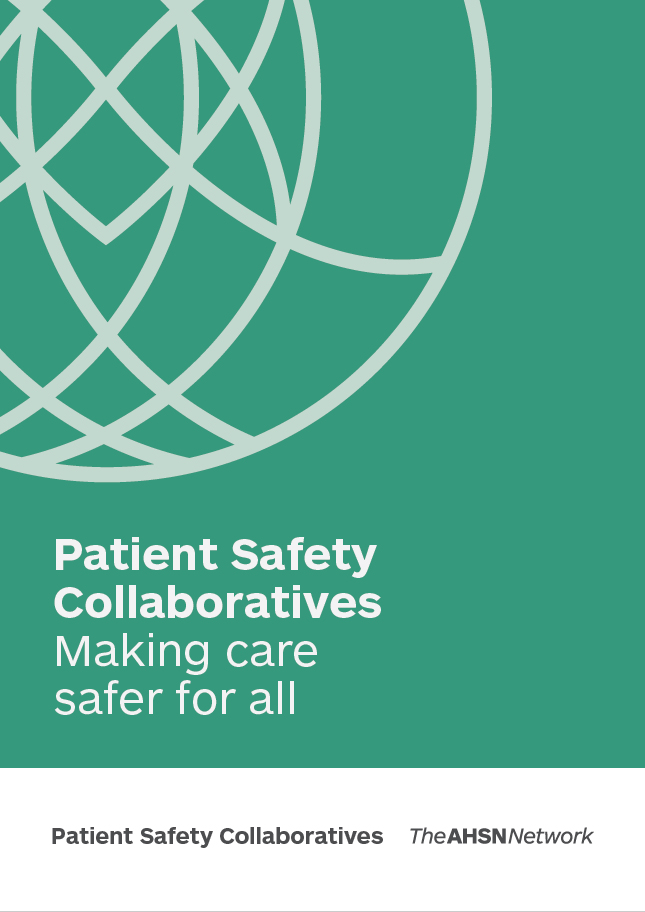Blog
Latest Patient Safety blog: guest blog from Dr Rosie Benneyworth, AHSN Network Lead for PSCs
4 July 2016

Blog
4 July 2016

Patient Safety Collaboratives – delivering on a promise.
It has been two years since Patient Safety Collaboratives (PSCs) were set up in response to the Berwick Report, A promise to learn – a commitment to act.
Professor Don Berwick wrote: ‘The most important single change in the NHS in response to this report would be for it to become, more than ever before, a system devoted to continual learning and improvement of patient care, top to bottom and end to end.’
The Collaboratives, the largest patient safety initiative in the history of the NHS, are run by England’s 15 Academic Health Science Networks and funded by NHS Improvement. They were the key recommendation in the Berwick Report to spread best practice and build skills and capabilities in patient safety and improvement science.
So what’s happened since then? Here are ten highlights of the work of Patient Safety Collaboratives, as showcased in their first collective report, Making care safer for all, launched at Patient Safety Congress.
1. Mortality after emergency laparotomies (major stomach surgery) reduced by 42 per cent over an eight-month period in 24 NHS acute trusts – led by Patient Safety Collaboratives Kent, Surrey, Sussex; West of England; and Wessex.
2. A cluster of nine Patient Safety Collaboratives are working together to create a common process and outcome measurement for people with acute kidney injury. This will be reported by the UK Renal Registry and rolled out nationally to improve safety and quality of care.
3. A 50 per cent increase in service users returning to mental health wards on time was achieved by Oxford Patient Safety Collaborative working with three NHS providers of mental health and community services, reducing the risk of self harm, self neglect and suicide when service users abscond from a mental health ward.
4. Inpatient medication errors across six NHS trusts were reduced from 11 per cent to nine per cent, after Imperial College Health Partners Patient Safety Collaborative worked with ten organisations in North West London.
5. Safety ‘huddles’ that led to a reduction of 60 per cent in falls by inpatients, as a result of Yorkshire and Humber Patient Safety Collaborative working with more than 66 frontline teams across 18 organisations, including two nursing homes and two GP teams. One ward moved from an average of one fall a week to repeatedly achieving no falls for more than 30 days.
6. Twelve Patient Safety Collaboratives, led by the Innovation Agency in the North West Coast, are working with the National Board for Sepsis on earlier identification and treatment of people with sepsis and the deterioration that sometimes arises as a result of the condition.
7. Six Patient Safety Collaboratives, led by East Midlands, are working together on safer discharge of patients and transfer of care.
8. Ten Patient Safety Collaboratives have adopted a web-based platform which provides the tools needed for quality improvement projects, including sharing data and plotting results in run charts, developed by South West AHSN.
9. The Collaboratives have created clusters around specific themes and health issues, to facilitate learning and adoption of innovation. The current priority areas include deterioration and sepsis; safer discharge; acute kidney injury; medicines optimisation; and mental health.
10. Acknowledgement from Dr Mike Durkin, NHS National Director of Patient Safety, who said: “The Patient Safety Collaboratives have played a critical role in delivering changes in the culture of patient safety across the NHS. We must create conditions that make the best use of our resources, both human and financial. The Collaboratives are about doing the right thing first time and every time.”
The Patient Safety Collaborative programme was launched in 2014, and now falls under the responsibility of NHS Improvement. Each of the 15 Collaboratives is led by its local AHSN and works to tackle leading causes of avoidable harm, bringing together teams from across the local health economy to draw on talents from the NHS, academia and healthcare industries. The Collaboratives work to identify local safety priorities and develop solutions before testing and implementing them within local healthcare organisations.
The Collaboratives also work together nationally to share successful initiatives so they can be implemented in other parts of the country - accelerating improvement across all care settings from maternity care and nursing homes, to GP practices and acute hospitals.
The Patient Safety Collaboratives, listed below, can be found at stand 14 at Patient Safety Congress 5-6 July. Come and meet us there; or find us online at: www.ahsnnetwork.com #AHSNs.
Imperial College Health Partners
You may also like to watch my introduction to the launch of the first national PSC report, Making care safer for all, below on YouTube.
Share
Need more information?
Contact the communications team:
(023) 8202 0858